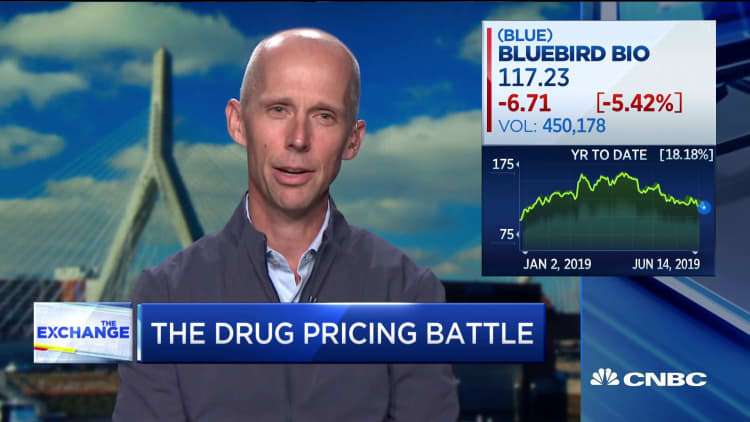
Bluebird Bio CEO Nick Leschly on Friday defended the biotech company's $1.8 million price tag for its new gene therapy to treat a rare genetic blood disorder.
Bluebird's therapy, Zynteglo, was approved in Europe earlier this month for patients with beta thalassemia who require regular blood transfusions to manage their disease and have no matching donor for a stem cell transplant. The price tag, set Friday, makes the drug the second most expensive in the world behind Swiss drugmaker Novartis' $2.1 million gene therapy for spinal muscular atrophy.
Leschly reasoned that the one-time treatment is a game changer for patients, giving them a "lifelong benefit" while avoiding costly blood transfusions every few weeks for the rest of their lives.
Bluebird said patients will only have to pay $1.8 million if the treatment works. The company proposed a five-year installment plan, with 315,000 euros, or $356,567, paid upfront and additional payments due only if the treatment proves effective. It's a form of value-based pricing, Leschly said.
"Neither Novartis' drug nor our drug is anywhere near the most expensive drug in the world. It's really thinking about it differently," Leschly said in an interview on CNBC's "The Exchange." "This is a good thing, a one time curative treatment."
Novartis and Bluebird's approvals mark a new era in medicine where new therapies can cure patients in a single treatment — but at a high price. Insurers and governments will need to figure out how to pay for these therapies and society will need to decide whether any drug, even lifesaving ones, are worth millions of dollars.
Bluebird expects the therapy to be approved for beta thalassemia in the U.S. in 2020.
In May, Novartis gave a similar reasoning on pricing for its one-time treatment for spinal muscular atrophy, a muscle-wasting disease and leading genetic cause of infant mortality.
In rationalizing the expensive price, Novartis said the one-time treatment costs 50% less than the 10-year cost of current chronic management of the disease. Another current treatment for spinal muscular atrophy for children and adults is Biogen's Spinraza, which has a list price of $750,000 for the first year and $375,000 annually thereafter.


